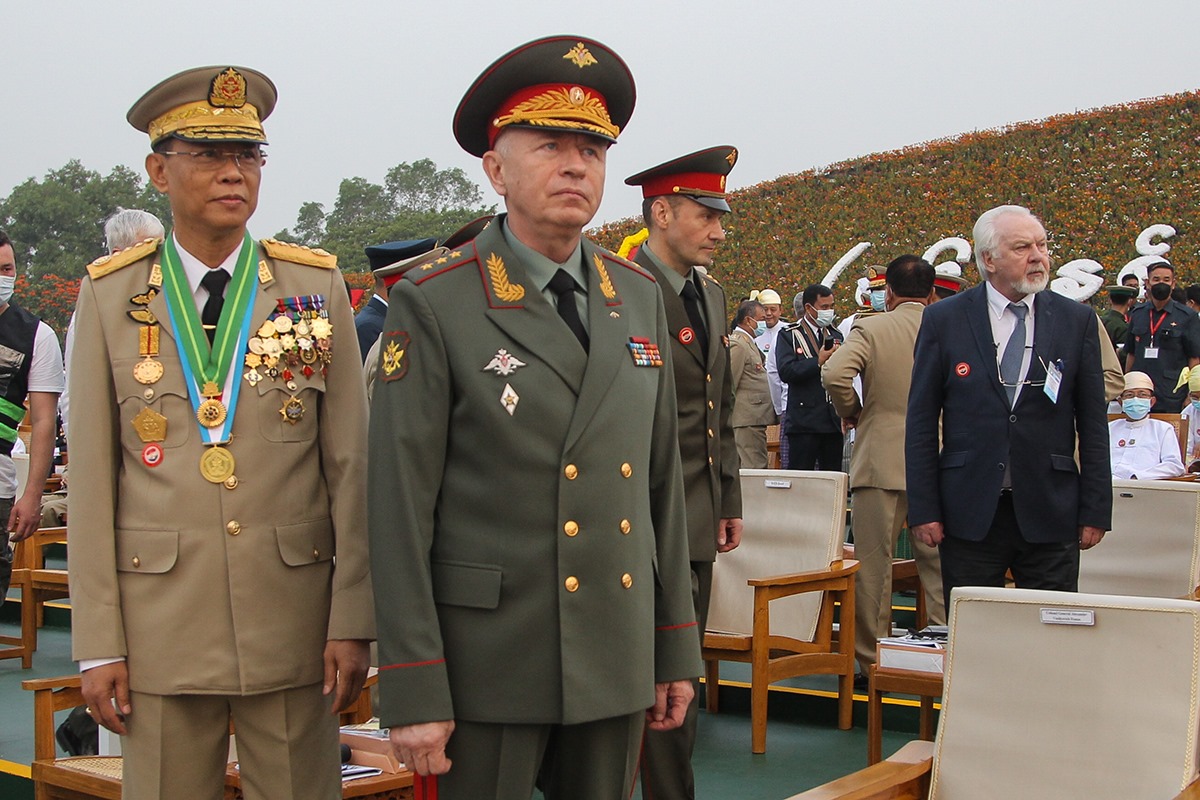The Myanmar junta sent a high-ranking military delegation to Moscow this week. Air force chief General Maung Maung Kyaw led the team and was accompanied by other high-ranking military officers.
Joining the delegation was well-known Myanmar tycoon U Tay Za, according to several business sources in Yangon and Naypyitaw. Early this week, U Tay Za flew in from Singapore to Myanmar’s capital on a private jet and held a series of meetings with top brass before the Russia trip. Sources in Myanmar added that the delegation members will discuss with their Russian counterparts over 20 megaprojects including procurement of arms and military hardware.

U Tay Za, founder and chairman of the Htoo Group, has lived in Singapore for years and his connections with Myanmar’s present and past regimes are known to be deep.
Under the previous military regime in the 2000s, the Htoo Trading Company was involved in timber, transport, tourism, construction, property development, palm oil production and military arms deals.
U Tay Za made his fortune from the timber business and subsequently expanded his dealings with the State Peace and Development Council (SPDC), as the regime of the time was known, by supplying the military with aircraft parts through his company Myanmar Avia Export. The company is Myanmar’s sole representative for Russia’s Export Military Industrial Group, known as MAPO, and of the Russian helicopter company Rostvertol.
After China, Russia is the country’s second-largest supplier of arms, being the source of at least 16 percent of weaponry procured by Myanmar from 2014-19. The regime is now awaiting delivery of six Su-30 fighter jets ordered in 2019, and in January 2021 the two sides signed contracts for the purchase of a Russian air defense system and a suite of surveillance drones.
The US Treasury put U Tay Za on its list of sanctioned Specially Designated Nationals in 2008 for providing support to the junta, including the purchase of military equipment and aircraft, according to a statement at the time. Washington’s objections were spelled out in more detail in a leaked 2007 US diplomatic cable that accuses U Tay Za of earning “hefty commissions from sales to the military of arms, ammunition, supplies, MI-17 helicopters and MiG-29 [fighter jets].”
U Tay Za has admitted selling Russian-made MI-17s, and continues to hold the service contracts and provide spare parts to Myanmar’s military.
In the middle of 2013, U Tay Za was also in Moscow when commander-in-chief Senior General Min Aung Hlaing (leader of the recent coup and current head of the State Administration Council) visited Russia to settle arms deals.
Under the U Thein Sein administration and the ousted Daw Aung San Suu Kyi government, U Tay Za largely dropped out of sight from Myanmar’s business circles, relocating to Singapore and buying residences in Thailand.
He returned to prominence in July 2017 when Htoo Group signed a memorandum of understanding with Vietnam’s Petrolimex on the import and distribution of petroleum products.
Under the previous military regime, Myanmar’s crony tycoons worked closely with the military rulers; valued for their expertise at circumventing sanctions, they were richly rewarded by the junta, which granted them concessions ranging from forestry to car imports.
In July 2014 Forbes reported that U Tay Za had made payments to North Korea-linked companies on behalf of the SPDC.
The 2007 US cable, which was brought to light by WikiLeaks, portrayed U Tay Za as part of the former regime’s inner circle. It called him Myanmar’s “number one crony businessman” and said he entertained regime leaders “lavishly” to “curry favor and win the most lucrative contracts.”
You may also like these stories:
Myanmar’s Japanese Business Community Says Japan ‘too considerate’ to Junta
ASEAN Must Engage With US, China
Regional Organizations Fall Short as Myanmar Continues to Bleed

















